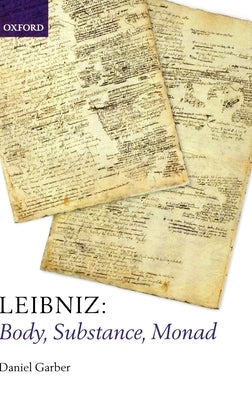Oxford University Press, USA
Leibniz: Body, Substance, Monad
Leibniz: Body, Substance, Monad
Regular price
€91,95 EUR
Regular price
Sale price
€91,95 EUR
Unit price
per
Shipping calculated at checkout.
Couldn't load pickup availability
Daniel Garber presents an illuminating study of Leibniz's conception of the physical world. Leibniz's commentators usually begin with monads, mind-like simple substances, the ultimate building-blocks of the Monadology. But Leibniz's apparently idealist metaphysics is very puzzling: how can any
sensible person think that the world is made up of tiny minds? In this book, Garber tries to make Leibniz's thought intelligible by focusing instead on his notion of body. Beginning with Leibniz's earliest writings, he shows how Leibniz starts as a Hobbesian with a robust sense of the physical
world, and how, step by step, he advances to the monadological metaphysics of his later years. Much of the book's focus is on Leibniz's middle years, where the fundamental constituents of the world are corporeal substances, unities of matter and form understood on the model of animals. For Garber
monads only enter fairly late in Leibniz's career, and when they enter, he argues, they do not displace bodies but complement them. In the end, though, Garber argues that Leibniz never works out the relation between the world of monads and the world of bodies to his own satisfaction: at the time of
his death, his philosophy is still a work in progress.
Author: Daniel Garber
Publisher: Oxford University Press, USA
Published: 09/28/2009
Pages: 464
Binding Type: Hardcover
Weight: 1.80lbs
Size: 9.20h x 6.30w x 1.30d
ISBN: 9780199566648
Review Citation(s):
Chronicle of Higher Education 09/25/2009 pg. 20
sensible person think that the world is made up of tiny minds? In this book, Garber tries to make Leibniz's thought intelligible by focusing instead on his notion of body. Beginning with Leibniz's earliest writings, he shows how Leibniz starts as a Hobbesian with a robust sense of the physical
world, and how, step by step, he advances to the monadological metaphysics of his later years. Much of the book's focus is on Leibniz's middle years, where the fundamental constituents of the world are corporeal substances, unities of matter and form understood on the model of animals. For Garber
monads only enter fairly late in Leibniz's career, and when they enter, he argues, they do not displace bodies but complement them. In the end, though, Garber argues that Leibniz never works out the relation between the world of monads and the world of bodies to his own satisfaction: at the time of
his death, his philosophy is still a work in progress.
Author: Daniel Garber
Publisher: Oxford University Press, USA
Published: 09/28/2009
Pages: 464
Binding Type: Hardcover
Weight: 1.80lbs
Size: 9.20h x 6.30w x 1.30d
ISBN: 9780199566648
Review Citation(s):
Chronicle of Higher Education 09/25/2009 pg. 20
About the Author
Daniel Garber received his Ph.D. in Philosophy from Harvard University in 1975. He taught at the University of Chicago from 1975, and from 2002 he has taught at Princeton University, where he is Professor and Chair in the Department of Philosophy and an Associate Member of the Program in History of Science.
This title is not returnable


